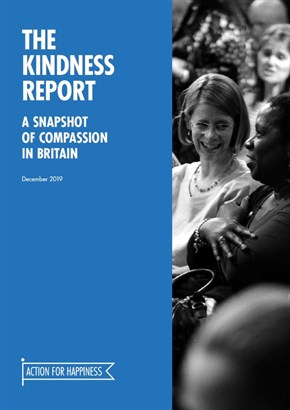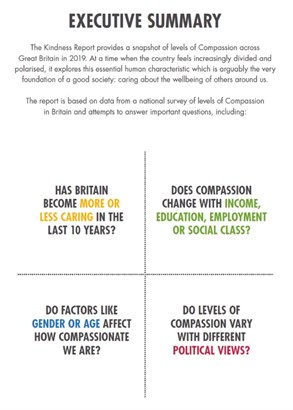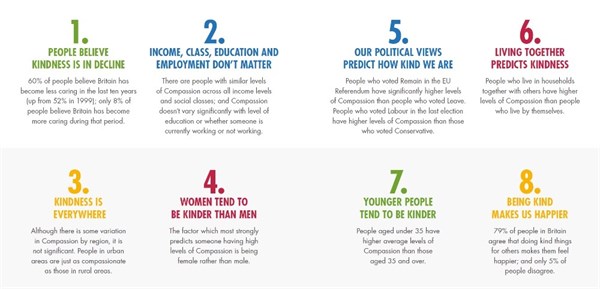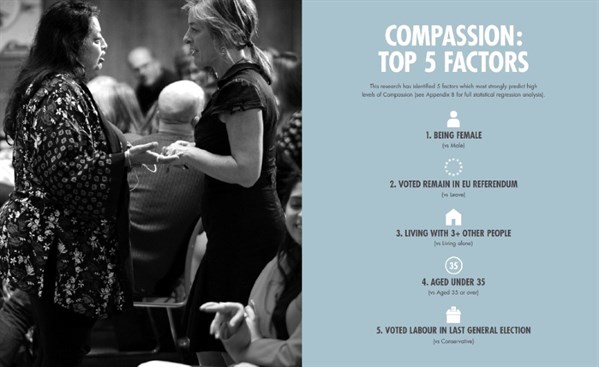The Kindness Report: a snapshot of Compassion in Britain
06 Dec 2019 | Action for Happiness
NEWS RELEASE
* 60% of people believe Britain has become less caring
over the last 10 years
* The Kindness Report reveals top 5 factors that predict
how compassionate we are: being female, voting Remain, living with
others, being under 35 and voting Labour.
* Income, social class and location don't matter when it
comes to how kind we are.


Are we becoming less kind?
New research has found that 60% of people think Britain
has become less caring in the last 10 years, while only 8%
of people believe Britain has become more caring. 49% agree that
people are kind in their local community and 44% agree that people
are kind in the country as a whole.
The Kindness Report: A snapshot of Compassion in
Britain is based on a national survey of compassion in
Britain, carried out by Ipsos Mori on behalf of the UK-based
charity Action for Happiness, with supporting statistical analysis
by Dr Christian Krekel at the Centre for
Economic Performance (part of the London School of Economics and
Political Science).
Headline Findings
The report found that the top 5 factors most strongly predicting
high levels of compassion are being female,
voting Remain in the 2016 EU referendum,
living with 3 or more other people, being
aged under 35 and voting Labour
at the 2017 general election. Income, social class and location
don't really matter when it comes to how compassionate we are;
likewise, levels of education and employment status do not have a
statistically significant effect.

Professor Richard Layard (London School of
Economics) said:
"These findings are remarkable. Although our nation seems
increasingly polarised and people think kindness is in decline,
it's encouraging to find that younger people feel the importance of
showing compassion and may in fact be kinder than their elders. And
as more women achieve the recognition and influence they deserve in
our society, their greater compassion should be a stronger force
for good. It's vital we do more to promote compassion in our
politics, institutions and communities."
Dr
Mark Williamson, Chief Executive of Action for Happiness
said:
"Kindness is the foundation for a good society and benefits us
all. Investigating kindness across Britain, this research shows
that where we live and how much we earn don't divide us; yet our
political differences do. There's a real link between how we vote
and how much we care about others. To create a better society, we
need to see beyond our divisions and unite around what we have in
common. We're happier when we help each other."
About This Study
The Ipsos Mori survey measured self-reported compassion using
the Santa Clara Brief Compassion Scale (SCBCS), an
internationally recognised and validated scale. Respondents were
given 5 statements relating to compassionate behaviour and asked
how true the statements are of them on a scale of 1-7. The overall
Compassion score is the average of these 5 responses, with higher
scores reflecting higher levels of Compassion.
The research involved 2,237 adults aged 16-75 in the
UK and was carried out between Friday 23rd and Tuesday
27th August 2019. The sample obtained is representative of the
population with quotas on age, gender, region and working status
and weighted to an offline nationally representative
population.
To determine what predicts high levels of Compassion, regression
analysis was used to identify which factors are most statistically
significant, when controlling for all other factors. Regression
analysis is a statistical technique to identify which independent
variables (e.g. age, gender, income etc) have an impact on the
dependent variable being measured (in this case Compassion). It
shows which factors matter most and which can be ignored.
Compassion: Top 5 Factors
- Being Female (vs Male), 0.128
- Voted Remain in EU Referendum (vs Leave),
0.116
- Living with 3+ people (vs living alone),
0.105
- Aged under 35 (vs Aged 35 or over), 0.102
- Voted Labour in last General Election (vs
Conservative), 0.083
Numbers show standardised scores (partial correlation
coefficients, β) from regression analysis

A wake-up call for our
leaders
Jennifer Nadel, co-founder of Compassion in
Politics said:
"This report is an urgent wake-up call for our leaders. The
culture of our politics and our society are intimately linked. The
past decade of austerity, blame, belittling migrants and welfare
recipients - and increasingly violent rhetoric in parliament - has
left Britain feeling divided and dispirited. This research shows
women have the highest levels of compassion, but female MPs are
being bullied out of politics and subjected to unacceptable threats
and intimidation. We urgently need politicians from all parties to
take a stand against hate, heal divisions, and begin to rebuild a
Britain based on kindness, compassion, and respect. These values
are at the heart of British life and we must not allow them to be
silenced."
Ben Paige, Chief Executive of Ipsos Mori
said:
"What is striking is that the majority of us feel society is
becoming less kind that in the past. This reflects our divisions,
highlighted in the media, and how we feel as a society. So we think
we are less kind - but actually charitable donations rise each
year, and the British report feeling happier than in the
past."
> Download the full report here
Action for Happiness runs volunteer led community courses across
the UK and provides support and information on how to lead a happy
and compassionate life. Find out more at www.actionforhappiness.org
NOTES TO EDITORS
For interviews, further comment and information please contact:
Sarah Vero, Head of Communications, Action
for Happiness: sarah.vero@actionforhappiness.org
The Ipsos Mori report and details tables can be found here.
The question "Thinking about how life in
Britain has changed over the last ten years, do you think that
people are now more caring, less caring or about the same?" was
previously asked by Ipsos MORI in 1999, when 52% felt Britain had
become less caring and 15% said more caring compared to in 2019
where 60% of people think Britain has become less while only 8%
said more caring.
The research used the Santa Clara Brief Compassion Scale with
respondents asked to answer the following 5 questions honestly and
quickly using a scale of 1-7 (where 1 is "not at all true of me"
and 7 is "very true of me"):
- When I hear about someone (a stranger) going through a
difficult time, I feel a great deal of compassion for him or
her
- I tend to feel compassion for people, even though I do not know
them
- One of the activities that provides me with the most meaning to
my life is helping others in the world when they need help
- I would rather engage in actions that help others, even though
they are strangers, than engage in actions that would help me
- I often have tender feelings toward people (strangers) when
they seem to be in need
Action for Happiness is a UK Charity with over
150,000 members and over a million online followers. Its patron is
the Dalai Lama. It has no commercial, political or religious
affiliations.
Action for Happiness promotes the Ten Keys to Happier Living
that are underpinned by the latest research in positive psychology.
It also provides daily actions people can take to be happier and
kinder through its app and online calendar, which is used by millions of
people.
The December Kindness Calendar 2019
provides an act of kindness you can do each day in December and is
a feel-good alternative to the usual commercial advent
calendars.
Action for Happiness' flagship 8-week Exploring What Matters
course has been run in over 250 locations and attended by thousands
of people. It also hosts regular public events, supports a network of
Happy Cafes and provides resources for schools and organisations.
Action for Happiness supports the #StopTheNastiness
campaign, an initiative started by Compassion in Politics, which
aims to encourage candidates to campaign with respect and promote
compassion during the general election campaign.
Polling done last month by Opinium on behalf of Compassion in
Politics found that two in three people agree that politicians
should undergo compassion training to help them work more
effectively with colleagues and the public. Polling work to date
from Compassion in Politics can be found
here.